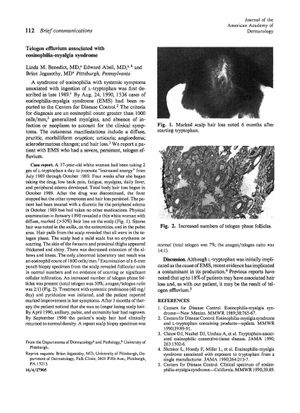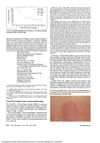Telogen Effluvium Associated with Eosinophilia-Myalgia Syndrome
July 1991
in “
Journal of The American Academy of Dermatology
”

TLDR Hair loss in a woman with eosinophilia-myalgia syndrome improved after stopping L-tryptophan and starting treatment.
In 1991, a case of severe, persistent telogen effluvium (a form of hair loss) was reported in association with eosinophilia-myalgia syndrome (EMS), a condition linked to the ingestion of L-tryptophan. The patient, a 37-year-old woman, experienced symptoms of EMS, including hair loss, after taking 2 grams of L-tryptophan daily for increased energy. Despite discontinuing the drug, her symptoms and hair loss persisted. Physical examination showed marked hair loss and a scalp biopsy revealed an increased number of telogen phase follicles. After treatment with systemic prednisone and pyridoxine, the patient's symptoms improved and her hair began to regrow, returning to normal density by September 1990. This case supports previous findings that up to 18% of EMS patients may experience hair loss due to telogen effluvium. Recent evidence suggested that a contaminant in the production of L-tryptophan, rather than L-tryptophan itself, may cause EMS.




